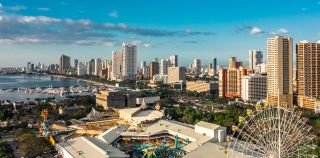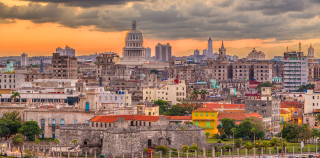- Some travel insurance plans can cover trips affected by hurricanes and tropical storms and offer complete or partial reimbursement of the total trip cost. (skip ahead to see these plans).
- A hurricane travel insurance policy can cover trip cancellations or interruptions due to damage at your destination, mandatory evacuations, or cancellations due to storm damage to your own residence.
- To ensure you are covered, you must purchase the travel insurance policy before the storm has been named. Otherwise, this coverage will be excluded.
- Travel insurance doesn’t automatically cover hurricanes, so you must purchase a policy that explicitly mentions hurricane coverage to ensure protection.
- Based on our analysis, travel policies that include hurricane coverage cost between $15 to $26 per day.
- Our picks of the best travel insurance for hurricane season come from Travel Insured, Seven Corners, AXA Assistance & Berkshire Hathaway.
The Best Hurricane Travel Insurance for 2024


On This Page
- Key takeaways
- Does travel insurance cover hurricanes and tropical storms?
- What does insurance cover when traveling during hurricane season?
- What is not covered by hurricane travel insurance?
- How much does travel insurance for hurricane coverage cost?
- When should I buy travel insurance for hurricane coverage?
- Travel insurance tips during hurricane season
- Frequently asked questions about hurricane travel insurance
- Related topics
On This Page
- Key takeaways
- Does travel insurance cover hurricanes and tropical storms?
- What does insurance cover when traveling during hurricane season?
- What is not covered by hurricane travel insurance?
- How much does travel insurance for hurricane coverage cost?
- When should I buy travel insurance for hurricane coverage?
- Travel insurance tips during hurricane season
- Frequently asked questions about hurricane travel insurance
- Related topics
Hurricane season in the Caribbean and Atlantic runs from June 1st to November 30th when the ocean water is warm enough for a hurricane to form, meaning hurricane season varies for different regions.
However, hurricanes happen all across the world. Due to differences in latitude and longitude, and the amount of sunlight received, ocean warming occurs at different rates, affecting hurricane timing across the globe.
The table below shows when hurricanes typically occur in each region.
| Region | Hurricane Season (dates) | Examples of countries affected |
|---|---|---|
| Atlantic & Caribbean | Jun 1 – Nov 30 | Bahamas Bermuda United States |
| Asian Pacific | May 15 – Nov 30 | Japan Korea Taiwan |
| American Pacific | May 15 – Nov 30 | Costa Rica Mexico Ecuador Peru |
| South Pacific | Nov 1 – Apr 30 | Australia French Polynesia New Zealand |
Our top picks for the best hurricane travel insurance
Our favorite hurricane travel insurance plans
Travel Insured International
AXA Assistance USA
Berkshire Hathaway Travel Protection
Does travel insurance cover hurricanes and tropical storms?
Yes, some travel insurance plans cover hurricanes and tropical storms, but not all do. If you want protection from hurricanes, you must purchase a policy with hurricane coverage listed as one of its benefits.
Additionally, you won’t be covered if you buy a policy after a storm has already been named.
Buying before a storm is named
Tropical storms and hurricanes are both categorized by a naming system (i.e. hurricane Katrina). Most companies exclude hurricane and tropical storm coverage for policies that were purchased after a major storm was named.
To be covered for a hurricane or tropical storm, you must buy travel insurance at least 24 hours before the storm is named.
What does insurance cover when traveling during hurricane season?
Travel insurance during hurricane season usually covers various expenses, depending on the policy type. This can include compensation for trip interruptions, cancellations, delays, medical treatment, evacuation costs, damaged personal belongings, and rental car damage.
While its main purpose is to reimburse lost travel expenses, it also provides some medical coverage for travelers.
Let’s delve into how various situations could affect your trip and how the different types of coverage mentioned earlier can provide assistance.
The destination is under a hurricane warning
A hurricane warning means that a destination is expected to have sustained winds of at least 74 miles per hour, according to the National Oceanic and Atmospheric Administration (NOAA). Some travel insurance policies reimburse you if your destination is under a hurricane warning issued by the NOAA.
Before you travel, it’s important to review the terms of your policy carefully. Check to see if you’re eligible for coverage if the NOAA issues a hurricane warning shortly before or during your travel.
There is storm damage at the destination
If a tropical cyclone inflicts significant damage on a hotel, vacation rental, or other property, rendering it uninhabitable, hurricane coverage can reimburse you for your losses. If it’s damaged before your vacation, trip cancellation coverage will apply. If it happens during your trip, trip interruption coverage steps in.
Natural disaster causes damage to your home
Sometimes, you need hurricane coverage due to a storm at your home instead of at your destination. For example, if a storm causes severe damage to your home right before you’re scheduled for a romantic getaway, you may not be able to travel as intended. A comprehensive hurricane travel insurance policy reimburses you for this type of loss.
Note that hurricane travel insurance doesn’t pay for any of the damage to your home. It only refunds your prepaid expenses. If a storm hits your home before your trip, cancellation coverage applies. If it hits during your trip, interruption coverage will kick in.
Your airline or cruise line cancels or delays due to weather
Sometimes, an airline or a cruise line must cancel or delay a journey due to poor weather conditions. Coverage for airline and cruise delays varies by policy, but you may be able to use your trip delay, trip cancellation or trip interruption insurance depending on the circumstances. This extends to most common carries (bus, train, ferry, etc.)
Mandatory evacuation order during trip
If a government agency issues a mandatory evacuation order, you must leave the area immediately. This is difficult enough when you’re going through a storm at home, but it’s even worse when you’re traveling because you may not be familiar with the region or know how to get help when you need it.
When shopping for hurricane trip insurance, look for a policy with trip interruption coverage that reimburses you for losses associated with mandatory evacuation orders. Having the extra coverage can help you avoid losing thousands of dollars.
Some policies include non-medical evacuation coverage, but you’ll likely need to use your trip interruption benefits to recoup evacuation-related expenses.
Your cruise vacation is affected by a hurricane
Cruises are even more susceptible to hurricanes, as they take place in the water instead of on land. Ship captains have to consider passenger safety and other factors when making decisions regarding cancellations and delays.
If a hurricane affects your cruise vacation, you may be able to use some combination of trip cancellation, trip interruption and trip delay benefits to recoup your prepaid, nonrefundable expenses.
What is not covered by hurricane travel insurance?
Even the most comprehensive hurricane travel insurance plans don’t cover every scenario.
As previously mentioned, hurricane coverage doesn’t apply to named storms. For example, if the NOAA announces a storm on November 1, you won’t be covered if you wait until November 5 to purchase your policy. You’d have to buy your coverage at least 24 hours beforehand.
Some companies refuse to cover policyholders if they live near their destinations. For instance, if you live in Orlando and plan to visit Miami, your hurricane travel insurance may not cover you if a hurricane hits Miami before or during your trip.
Normal inclement weather is not covered. Typically, bad weather that doesn’t cause significant delays to a common carrier or render a location uninhabitable is not enough to claim reimbursement under your travel insurance cancellation policy.
How much does travel insurance for hurricane coverage cost?
The cost of hurricane travel insurance varies depending on factors like your destination, trip duration and total trip cost.
To give you an idea of the cost, example quotes for travel insurance plans that cover cancellation or interruption due to natural disasters or severe weather events for a trip to Mexico.
We applied the following criteria to each quote:
- Age: 35
- Trip duration: Seven days
- Average Trip cost: $2,000
- Destination: Mexico
- Time of trip: November 2024
- State of residency: California
In this example, you can see that travel insurance that includes hurricane coverage costs around $15 to $26 per day.
Cost Example of Plans That Provide Hurricane Coverage
| Provider | Plan Name | Plan Cost | Cancellation / Interruption Limits | Medical / Medevac Limits |
|---|---|---|---|---|
| Travel Insured International | Worldwide Trip Protector | $112 | $2K / $3K | $100K / $1M |
| AXA Assistance USA | Platinum | $104 | $2K / $3K | $250K / $1M |
| Berkshire Hathaway Travel Protection | LuxuryCare | $182 | $2K / $3K | $100K / $1M |
Since travel insurance costs depend on multiple factors, the quotes you see may not reflect your actual expense. For accurate pricing, it’s best to obtain a personalized quote.
When should I buy travel insurance for hurricane coverage?
Consider getting travel insurance with hurricane coverage in these situations.
You are traveling during hurricane season
If you’re traveling during hurricane season, research your destination carefully. Buying hurricane travel insurance is a no-brainer if your destination is known for hurricane activity. For example, if you plan to visit the Bahamas in July, you’ll be traveling right in the middle of the Atlantic hurricane season.
You live in an area prone to natural disasters
Even if the weather at your destination is perfect, that doesn’t mean you don’t need hurricane travel insurance. You should buy a policy if you live in an area prone to hurricanes and other natural disasters.
If your home sustains severe damage before or during your vacation, you’ll be able to use your travel insurance policy to get back some of the money you spent.
You are going on a cruise
Cruises are highly dependent on weather patterns. Sudden changes in temperature or wind speed can cause unexpected delays or cancellations. You should purchase hurricane travel insurance to protect you under these circumstances.
Travel insurance tips during hurricane season
Use these tips to find the best travel insurance for your trip during hurricane season.
Buy travel insurance early to ensure you’re covered.
Many providers require you to purchase coverage at least 24 hours before a storm is named. Otherwise, the hurricane won’t be covered, and you may not be able to recoup any of your expenses.
Check the booking policy.
Some providers only allow full coverage for up to seven days after you book your trip. If you purchase travel insurance while booking, there’s a better chance you’ll be able to recoup your expenses if a hurricane impacts your trip. You can still purchase travel insurance during your trip, but you will likely have limited options. Trip cancellation won’t be included, your coverage may be delayed due to mandatory waiting periods and most hurricane-related coverage won’t apply.
Opt for trip cancellation and interruption coverage.
Trip cancellation and interruption coverage are usually optional, but most hurricane-related benefits are linked to these two types of insurance. If you don’t pay for trip cancellation and interruption coverage, you may not be able to recoup many of your expenses.
Take advantage of 24-hour travel assistance and concierge services through your travel insurance.
If a hurricane interrupts your trip, contact your insurer’s concierge service. Trained agents are available to help you adjust your plans, maximizing the chances that you’ll be reimbursed for your hurricane-related losses.
Consider opting for CFAR insurance for full protection.
Standard trip cancellation insurance only reimburses you if you cancel for a covered reason. For even more protection, consider getting cancel-for-any-reason coverage. This type of coverage reimburses you for a percentage of your prepaid, nonrefundable expenses if you decide to cancel for a non-covered reason.
Frequently asked questions about hurricane travel insurance
What is covered if my home is hit by a hurricane?
If your home is hit by a hurricane, your travel insurance policy cannot pay for damage to your property, but it can allow you to cancel your trip and be reimbursed for the full cost (minus eligible refunds).
Does travel insurance cover severe weather?
Yes, but with some exceptions. In the event of a hurricane, your travel insurance policy may reimburse you if you have to cancel because your destination is uninhabitable.
Travel insurance may also protect you in the event of an airline, train, bus or cruise delay caused by inclement weather. Generally, it must be an extended delay — not a delay of an hour or two.
What is the best travel insurance plan to have for hurricane season?
The best travel insurance plan depends on where you’re going, how much you’re spending and what kind of coverage you need. Ideally, your insurance plan will include trip cancellation, trip interruption and trip delay benefits. It’s also important to make sure your policy includes hurricane-related coverage.
If you’re concerned about the effects of a hurricane on your trip, look for a policy that covers mandatory evacuations, airline delays, itinerary changes and other situations. The more coverage you have, the more money you’re likely to get back if a hurricane impacts your trip in some way.
Do credit card travel protections cover hurricanes?
It depends on the terms of the policy. If your credit card comes with comprehensive travel insurance, it may cover hurricane-related losses. Some plans are very limited, however, and don’t include coverage for losses associated with inclement weather. Check the terms of your policy carefully to determine exactly what it covers.
Does travel insurance cover my cruise if there is a hurricane?
Your travel insurance policy should cover your cruise if there’s a hurricane, provided you purchased a plan with hurricane coverage included. Additionally, your plan needs to have trip interruption and trip cancellation coverage, as most hurricane-related benefits are bundled with those types of insurance.
When is hurricane season in Florida?
Florida is situated along the Atlantic coast, so its hurricane season runs from June 1 through November 30 each year.
When is hurricane season in the Caribbean?
The Caribbean hurricane season runs from June 1 through November 30, just like hurricane season in Florida.
When is hurricane season in Hawaii?
Hawaii is in the Pacific Ocean, so its hurricane season runs from June through November.































































